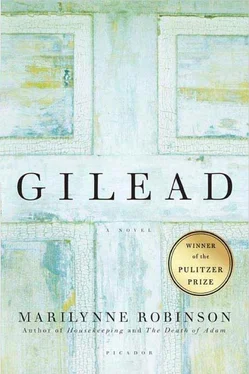If Rebecca had lived, she’d be fifty-one, older than your mother is now by ten years. For a long time I used to think how it would be if she walked in that door, what I would not be ashamed, at least, to say in her hearing. Because I always imagined her coming back from a place where everything is known, and hearing my hopes and my speculations the way someone would who has seen the truth face-to-face and would know the full measure of my incomprehension. That was a sort of trick I played on myself, to keep from taking doctrines and controversies too much to heart. I read so many books in those days, and I was always disputing in my mind with one or another of them, but I think I usually knew better than to take too much of that sort of thing into the pulpit. I believe, though, that it was because I wrote those sermons as if Rebecca might sometime walk in the door that I was somewhat prepared when your mother walked in, younger than Rebecca would have been in fact, of course, but not very different from the way I saw her in my mind. It wasn’t so much her appearance as it was the way she seemed as if she didn’t belong there, and at the same time as if she were the only one of us all who really did belong there.
I say this because there was a seriousness about her that seemed almost like a kind of anger. As though she might say, “I came here from whatever unspeakable distance and from whatever unimaginable otherness just to oblige your prayers.
Now say something with a little meaning in it.” My sermon was like ashes on my tongue. And it wasn’t that I hadn’t worked on it, either. I worked on all my sermons. I remember I baptized two infants that day. I could feel how intensely she watched. Both the creatures wept when I touched the water to their heads the first time, and I looked up, and there was just the look of stern amazement in her face that I knew would be there even before I looked up, and I felt like saying quite sincerely, “If you know a better way to do this, I’d appreciate your telling me.” Then just six months later I baptized her. And I felt like asking her, “What have I done? What does it mean?”
That was a question that came to me often, not because I felt less than certain I had done something that did mean something, but because no matter how much I thought and read and prayed, I felt outside the mystery of it. The tears ran down her face, dear woman. I’ll never forget that. Unless I forget everything, as so many of the old people do. It appears I at least won’t live long enough to forget much I haven’t forgotten already, which is a good deal, I know. I have thought about baptism over the years. Boughton and I have discussed it often. Now, this might seem a trivial thing to mention, considering the gravity of the subject, but I truly don’t feel it is. We were very pious children from pious households in a fairly pious town, and this affected our behavior considerably. Once, we baptized a litter of cats. They were dusty little barn cats just steady on their legs, the kind of waifish creatures that live their anonymous lives keeping the mice down and have no interest in humans at all, except to avoid them. But the animals all seem to start out sociable, so we were always pleased to find new kittens prowling out of whatever cranny their mother had tried to hide them in, as ready to play as we were. It occurred to one of the girls to swaddle them up in a doll’s dress — there was only one dress, which was just as well since the cats could hardly tolerate a moment in it and would have to have been unswaddled as soon as they were christened in any case. I myself moistened their brows, repeating the full Trinitarian formula.
Their grim old crooked-tailed mother found us baptizing away by the creek and began carrying her babies off by the napes of their necks, one and then another. We lost track of which was which, but we were fairly sure that some of the creatures had been borne away still in the darkness of paganism, and that worried us a good deal. So finally I asked my father in the most offhand way imaginable what exactly would happen to a cat if one were to, say, baptize it. He replied that the Sacraments must always be treated and regarded with the greatest respect. That wasn’t really an answer to my question. We did respect the Sacraments, but we thought the whole world of those cats. I got his meaning, though, and I did no more baptizing until I was ordained.
Two or three of that litter were taken home by the girls and made into fairly respectable house cats. Louisa took a yellow one. She still had it when we were married. The others lived out their feral lives, indistinguishable from their kind, whether pagan or Christian no one could ever tell. She called her cat Sparkle, for the white patch on its forehead. It disappeared finally. I suspect it got caught stealing rabbits, a sin to which it was much given, Christian cat that we knew it to be, stiff-jointed as it was by that time. One of the boys said she should have named it Sprinkle. He was a Baptist, a firm believer in total immersion, which those cats should have been grateful I was not. He told us no effect at all could be achieved by our methods, and we could not prove him wrong. Our Soapy must be a distant relative.
I still remember how those warm little brows felt under the palm of my hand. Everyone has petted a cat, but to touch one like that, with the pure intention of blessing it, is a very different thing. It stays in the mind. For years we would wonder what, from a cosmic viewpoint, we had done to them. It still seems to me to be a real question. There is a reality in blessing, which I take baptism to be, primarily. It doesn’t enhance sacredness, but it acknowledges it, and there is a power in that. I have felt it pass through me, so to speak. The sensation is of really knowing a creature, I mean really feeling its mysterious life and your own mysterious life at the same time. I don’t wish to be urging the ministry on you, but there are some advantages to it you might not know to take account of if I did not point them out. Not that you have to be a minister to confer blessing. You are simply much more likely to find yourself in that position. It’s a thing people expect of you. I don’t know why there is so little about this aspect of the calling in the literature.
Ludwig Feuerbach says a wonderful thing about baptism. I have it marked. He says, “Water is the purest, clearest of liquids; in virtue of this its natural character it is the image of the spotless nature of the Divine Spirit. In short, water has a significance in itself, as water; it is on account of its natural quality that it is consecrated and selected as the vehicle of the Holy Spirit. So far there lies at the foundation of Baptism a beautiful, profound natural significance.” Feuerbachy is a famous atheist, but he is about as good on the joyful aspects of religion as anybody, and he loves the world. Of course he thinks religion could just stand out of the way and let joy exist pure and undisguised. That is his one error, and it is significant. But he is marvelous on the subject of joy, and also on its religious expressions.
Boughton takes a very dim view of him, because he unsettled the faith of many people, but I take issue as much with those people as with Feuerbach. It seems t o m e some people just go around looking to get their faith unsettled. That has been the fashion for the last hundred years or so. My brother Edward gave his book to me, The Essence of Christianity, thinking to shock me out of my uncritical piety, as I knew at the time. I had to read it in secret, or so I believed. I put it in a biscuit tin and hid it in a tree. You can imagine, reading it in those circumstances gave it a great interest for me. And I was very much in awe of Edward, who had studied at a university in Germany.
I realize I haven’t even mentioned Edward, though he has been very important to me. As he is still, God rest his soul. I feel in some ways as if I hardly knew him, and in others as if I have been talking to him my whole life. He thought he would do me a favor, taking a bit of the Middle West out of me. That was the favor Europe had done for him. But here I am, having lived to the end the life he warned me against, and pretty well content with it, too, all in all. Still, I know I am touchy on the subject of parochialism.
Читать дальше












